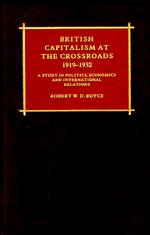 British Capitalism at the Crossroads, 1919–1932
British Capitalism at the Crossroads, 1919–1932 Book contents
- Frontmatter
- Contents
- Preface
- List of abbreviations
- Introduction
- 1 THE POLITICS OF ECONOMIC INTERNATIONALISM
- 2 CRUCIFIED ON A CROSS OF GOLD
- 3 ‘NORMALCY’
- 4 CONFLICT OVER COMMERCE
- 5 THE SCRAMBLE FOR GOLD
- 6 THE SECOND LABOUR GOVERNMENT AT THE HAGUE
- 7 FREE TRADE: THE LAST OFFENSIVE
- 8 THE CHALLENGE OF REGIONALISM
- 9 THE GOLD STANDARD UNDERMINED
- 10 THE AUSTRO-GERMAN CUSTOMS UNION CRISIS
- 11 THE COLLAPSE OF ECONOMIC INTERNATIONALISM
- Conclusion
- Notes
- Bibliography
- Index
10 - THE AUSTRO-GERMAN CUSTOMS UNION CRISIS
Published online by Cambridge University Press: 05 November 2011
- Frontmatter
- Contents
- Preface
- List of abbreviations
- Introduction
- 1 THE POLITICS OF ECONOMIC INTERNATIONALISM
- 2 CRUCIFIED ON A CROSS OF GOLD
- 3 ‘NORMALCY’
- 4 CONFLICT OVER COMMERCE
- 5 THE SCRAMBLE FOR GOLD
- 6 THE SECOND LABOUR GOVERNMENT AT THE HAGUE
- 7 FREE TRADE: THE LAST OFFENSIVE
- 8 THE CHALLENGE OF REGIONALISM
- 9 THE GOLD STANDARD UNDERMINED
- 10 THE AUSTRO-GERMAN CUSTOMS UNION CRISIS
- 11 THE COLLAPSE OF ECONOMIC INTERNATIONALISM
- Conclusion
- Notes
- Bibliography
- Index
Summary
In 1929 the chief issue confronting the Labour government was reparation revision, along with high and rising interest rates. In 1930 it was the drastic fall-off in world trade and upsurge in unemployment. Now in January 1931 it was the budget question that came to the fore. The government was committed to providing for the poor and unemployed, and obliged to maintain confidence in the pound by balancing the budget: objectives that were becoming harder to reconcile in face of the rising social security payments and dwindling revenues caused by the world slump. At this time renewed efforts were made to devise collective solutions for Europe's deepening politico-economic crisis. Britain, however, stayed on the sidelines, her politicians immersed in party conflict, and the public unaware of the role open to her to play in events across the Channel. Within Whitehall such awareness dawned gradually, but differences over political and economic priorities nullified attempts to provide anything but further obstruction.
Britain versus European preference schemes
Early in January Alexander Loveday, head of the League financial section, informed Sir Frederick Leith Ross that the Little Entente states intended to propose a system of intra-European preferences at the next session of Briand's Committee of Enquiry for European Union (CEUE). Leith Ross was sure Britain would insist on full most-favoured-nation treatment. Loveday, who attached ‘a good deal of importance’ to the proposal, warned that this would be a mistake.
- Type
- Chapter
- Information
- British Capitalism at the Crossroads, 1919–1932A Study in Politics, Economics, and International Relations, pp. 306 - 329Publisher: Cambridge University PressPrint publication year: 1988


